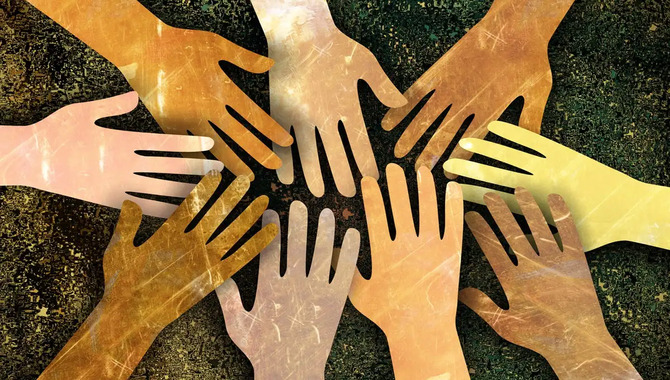When you’re in a relationship with someone from a different culture than your own, it’s important to be respectful of their customs and traditions. At the same time, you shouldn’t have to give up your cultural identity to make things work.
Here are a few tips on how to navigate cultural differences in a relationship:
- Communicate openly and honestly with each other about your respective cultures. Discuss what aspects are important to you and why.
- Be willing to compromise and try new things. If your partner wants to introduce you to their traditional cuisine, for example, go ahead and give it a try!
- Don’t make assumptions about each other’s cultures. Ask questions and be curious about things you don’t understand.
- Seek out resources to learn more about each other’s cultures. This can be anything from books and articles to movies and music.
- Respect each other’s differences. Remember that just because someone is from a different culture doesn’t mean they’re any less worthy of respect.
By following these tips, you can create a strong, lasting relationship despite any cultural differences.

What Are Some Common Cultural Differences That Can Cause Problems In A Relationship?

When two people from different cultures get together, there can be a lot of potential for misunderstanding and conflict. Even though we all share the same basic human emotions, how we express them can be very different. And what may be considered polite or acceptable in one culture can be seen as rude or offensive in another.
Here are some common cultural differences that can cause problems in a relationship:
1.Different Ways Of Communication
Some cultures are more direct in communicating, while others are more indirect. This can lead to misunderstandings when one person is trying to be polite, and the other is trying to be honest.
2.Different Attitudes Toward Time
Some cultures value punctuality and view it as a sign of respect, while others are more relaxed about time and view it as more flexible. This can cause conflict if one person is always late or forgets to keep appointments.
3.Different Ideas About Personal Space
Some cultures value personal space and view it as a sign of respect, while others are likelier to stand close to someone when talking to them. This can cause discomfort or even feelings of claustrophobia if one person is always in the other person’s personal space.
4.Different Attitudes Toward Food
Some cultures view food as fuel and a necessary part of life, while others view food as a pleasure and a way to socialize. This can cause conflict if one person is always trying to diet or eat healthily while the other wants to enjoy a meal.
5.Different Ideas About Family
Some cultures view family as a source of support and view it as a positive thing, while others view it as a source of conflict and as a negative thing. This can cause tension if one person is always trying to please their family and the other is always trying to distance themselves from their family.
6.Different Ideas About Religion
Some cultures view religion as a way to connect with a higher power and view it as a positive thing, while others view religion as a way to control people and view it as a negative thing. This can cause conflict if one person is always trying to proselytize or the other person is always trying to avoid religious discussions.
7.Different Ideas About Money
Some cultures view money as a way to get ahead in life and view it as a positive thing, while others view money as a way to control people and view it as a negative thing. This can cause conflict if one person is always trying to save money and the other is always trying to spend money.
8.Different Ideas About Work
Some cultures view work as a way to provide for oneself and view it as a positive thing, while others view work as a way to control people and view it as a negative thing. This can cause conflict if one person is always trying to work hard and the other is always trying to take it easy.
9.Different Ideas About Leisure
Some cultures view leisure as a way to relax and view it as a positive thing, while others view leisure as a way to waste time and view it as a negative thing. This can cause conflict if one person is always trying to take vacations and the other is always trying to stay home and work.
10.Different Ideas About Relationships
Some cultures view relationships as a way to build trust and view them as a positive thing, while others view relationships as a way to control people and view them as a negative thing. This can cause conflict if one person is always trying to be independent and the other is always trying to be dependent.
What Are Some Ways To Prevent Or Resolve Conflicts Caused By Cultural Differences?

Cultural differences can lead to misunderstandings and conflict in the workplace. To prevent or resolve these issues, it is important to be aware of cultural differences and be respectful of others. One way to prevent misunderstandings is to communicate openly and honestly with coworkers. If you are not sure about something, ask questions and get clarification. It is also important to avoid making assumptions about others.
If a conflict does arise, try to resolve it through open and respectful communication. It may be helpful to have a mediator present to help facilitate the discussion. Consulting with superiors or human resources may be necessary if the conflict cannot be resolved.
Cultural differences can be a source of richness and diversity in the workplace. By being aware of these differences and respecting others, we can prevent or resolve conflicts and create a more harmonious workplace.
How Can You Tell If Your Partner Is Struggling To Adjust To Your Culture?

It can be difficult to tell if your partner struggles to adjust to your culture, but there are some common signs to look out for. If your partner is suddenly more withdrawn or isolated, seems more irritable or short-tempered, or starts to withdraw from activities they used to enjoy, these could be signs that they are struggling to adjust.
If you notice any of these changes in your partner, it’s important to talk to them about it. Ask them how they’re feeling and if there’s anything you can do to help them adjust. It’s also important to be understanding and patient – remember that it can take time for someone to feel truly comfortable in a new culture.
For example, my partner is from a different culture from me. When we first started dating, I noticed he was a bit withdrawn and struggled to adjust to my culture. I was patient with him, and we talked about it, and over time he slowly started to open up more and become more comfortable. We’re married, and he’s fully adjusted to my culture – but it took time and patience.
What Are Some Signs You Need To Take Back And Reassess Your Cultural Differences?

When two people from different cultures come together, there are bound to be some differences. Sometimes these differences can be minor, but other times they can be major. If you find yourself in a situation where you’re not sure whether or not you should take a step back and reassess your cultural differences, here are some signs to look for:
1.You’re Constantly Feeling Uncomfortable
If you’re constantly feeling uncomfortable around someone from a different culture, it’s probably a sign that you must take a step back and reassess the situation. You may be just not used to the differences, and you’ll start to feel more comfortable with time. However, it’s also possible that the differences are too great and that you’ll never feel completely comfortable. In that case, it might be best to take a step back and reassess your cultural differences.
2.You’re Not Sure How To Act
If you find yourself in a situation where you’re unsure how to act, it’s probably a sign that you must take a step back and reassess your cultural differences. For example, if you’re unsure whether it’s appropriate to hug someone from a different culture, it’s probably best to err on the side of caution and not do it. If you’re unsure whether it’s appropriate to talk about certain topics, it’s probably best to avoid those topics.
3.You’re Not Sure What To Say
If you find yourself in a situation where you’re unsure what to say, it’s probably a sign that you need to take a step back and reassess your cultural differences. For example, if you’re unsure whether it’s appropriate to ask someone from a different culture about their religion, it’s probably best to avoid that topic. If you’re unsure whether it’s appropriate to ask someone from a different culture about their political views, it’s probably best to avoid that topic.
4.You’re Feeling Frustrated
Feeling frustrated is probably a sign that you must step back and reassess your cultural differences. It’s possible that the differences are just too great and that you’ll never be able to understand or relate to the other person fully. In that case, it might be best to accept your differences and move on.
5.You’re Feeling Angry
If you feel angry, it’s probably a sign that you must step back and reassess your cultural differences. It’s possible that you’re feeling frustrated and that the anger is just a manifestation of that frustration. However, it’s also possible that the anger is warranted and the other person has done something truly offensive.
In that case, it might be best to confront the person and try to resolve the issue. If you find yourself in a situation where you’re unsure whether you should take a step back and reassess your cultural differences, these are some signs to look for.
If you’re in a relationship with someone from a different culture, here are a few tips for navigating cultural differences:
- Be patient and understand that there may be some things your partner does or says that you don’t understand. Remember that they come from different perspectives, and try to be open-minded.
- Communicate with each other. If something is bothering you or you don’t understand, talk to your partner about it. They may help explain things better or help you see things from a different perspective.
- Be respectful of each other’s cultures. Just because you may not agree with everything about your partner’s culture doesn’t mean you should disrespect it. Try to learn about it and understand where they’re coming from.
- compromise. If there are certain cultural differences you can’t seem to overcome, try to find a compromise that works for both of you. Maybe there’s a middle ground that you can meet on.
- Have patience and understanding. Cultural differences can be tough to navigate, but it’s important to remember that your partner is worth the effort. Be patient with each other and try to understand where the other is coming from.


